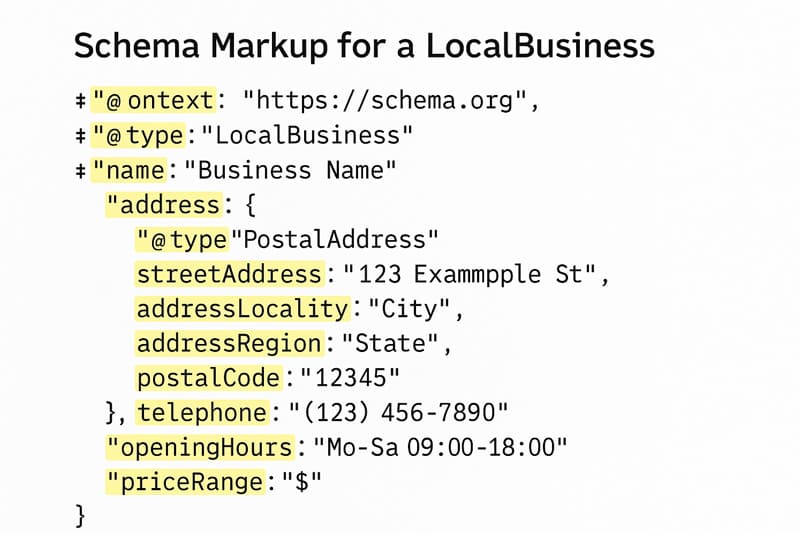Transform Your SEO with Structured Data That Works for Google and AI
Advanced Schema SEO
D Koder Marketing’s advanced schema markup SEO services in Pennsylvania empower your business to stand out in search results, capture more clicks, and stay future-ready for AI-driven search.
Get Found Faster: Expert Schema Strategies for Rich Search Results
Advanced Schema Markup: Hidden SEO Techniques That Actually Work
What if a simple code addition could boost your click-through rates by 25%? Rotten Tomatoes discovered exactly this when they enhanced their pages with advanced schema markup – their structured data implementation significantly outperformed standard pages. This hidden SEO technique now stands as essential for businesses wanting to dominate search results.
Schema markup represents structured data that makes your website content crystal clear to search engines. DKM has witnessed this powerful tool reshape search visibility for countless clients. Major brands prove its impact: Nestlé achieved an 82% higher click-through rate for rich result pages, Rakuten saw users spend 1.5x more time on structured data pages, and The Food Network experienced a 35% visit increase after converting 80% of their pages for enhanced search features.
Your business needs this competitive edge. Advanced schema markup strategies provide search engines with detailed content understanding, separating you from competitors who ignore these techniques. Google supports three primary schema types: JSON-LD (their recommendation), Microdata, and RDFa – each delivering unique advantages based on your website structure. This guide reveals the hidden schema techniques that deliver real results and shows you exactly how to implement them for maximum SEO performance.
What is Schema Markup and Why It Matters
Schema markup is specialized code that transforms your website content from ambiguous text into clear, defined entities that search engines instantly recognize. This semantic layer creates “things” – identifiable entities with explicit meaning. DKM has observed how this translator between your content and search algorithms fundamentally changes how search engines interpret your pages.
How schema markup helps search engines understand your content
Search engines like Google, Bing, and Yahoo created schema markup as their universal language to streamline web content interpretation in search results. Instead of depending entirely on natural language processing – a resource-heavy and imperfect method – schema markup provides key-value pairs that search engines understand immediately. You’re essentially reducing the computational work search engines need to comprehend your pages, optimizing content delivery at its core.
The difference between structured and unstructured data
Structured data follows predefined formats that organize into neat patterns, while unstructured data operates without rigid structure. Your webpage text, images, videos, and audio files represent unstructured data – content machines can decode but struggle to understand contextually without help.
Unstructured data makes up roughly 90% of all enterprise-generated information. This creates both challenge and opportunity. Schema markup converts vague content into clearly defined entities with searchable relationships that search engines process and categorize efficiently.
Why schema markup is essential for modern SEO
Schema markup doesn’t directly influence rankings, but it qualifies your pages for rich results – those standout, enhanced listings that dramatically boost search visibility. These enhanced results deliver:
- Superior click-through rates that separate your listing from competitors
- Enhanced user experience through direct information display in search results
- Stronger alignment between your content and relevant search queries
Schema markup also powers voice search results, gaining critical importance as voice assistants become mainstream. DKM has watched schema implementation forge stronger connections between businesses and target audiences by enabling search engines to match content with user intent accurately.
Schema markup perfectly aligns with AI algorithm entity categorization, positioning your site for future search technology evolution. Advanced schema markup implementation delivers immediate visibility gains plus long-term SEO advantages.
Hidden Schema Techniques That Actually Work
Basic schema implementation only scratches the surface. Advanced schema markup techniques can dramatically amplify your search visibility when executed correctly. DKM has identified these hidden schema strategies that consistently deliver measurable results for our clients.
Using nested schema to build context
Nested schema markup creates hierarchical structures by embedding one schema type within another – think Russian dolls for your website code. This technique establishes clear relationships between different entities on your page, giving search engines complete context about your content. When you embed a Person schema within an Article schema, you create a richer knowledge graph that search engines can fully understand and utilize.
Nested schemas outperform isolated markup because they clarify hierarchy and entity relationships. Instead of marking up elements separately, you provide search engines with a comprehensive view of how everything connects. This contextual clarity often translates into better rich result eligibility and more accurate content matching.
Dynamic schema with JavaScript and JSON-LD
JSON-LD stands as Google’s preferred schema format for good reason – it enables dynamic implementation that adapts automatically to your content changes. Your schema updates in real-time based on page content without requiring manual intervention. DKM implements dynamic schema through Google Tag Manager or custom JavaScript, generating markup on-demand.
This approach proves invaluable for websites with frequently changing content, single-page applications, or dynamic elements like user ratings and review counts. Rather than manually updating static schema, your structured data stays current automatically.
FAQPage and HowTo schema for featured snippets
FAQPage and HowTo schema types excel at capturing featured snippets in search results. FAQPage markup structures your questions and answers to increase “People Also Ask” box appearances, while HowTo markup transforms instructional content into step-by-step search result displays.
Recent Google updates have restricted FAQPage rich results primarily to authoritative government and health websites. However, implementing this markup still enhances machine-readability and improves your chances of appearing in other SERP features beyond traditional rich results.
Creating custom schema types for niche content
Standard schema types sometimes fail to adequately describe specialized industry content. Custom schema markup fills this gap by creating industry-specific schemas tailored to your unique offerings. This technique particularly benefits businesses in specialized niches where existing schemas don’t capture the full scope of their products or services.
Custom schema types provide search engines with precise content representation, potentially generating more relevant search appearances and unique rich snippets that competitors can’t replicate with standard markup alone.
How to Implement Advanced Schema Markup
Technical precision determines your schema success. DKM’s implementation experience shows that format selection and deployment method create the difference between mediocre and exceptional SEO results.
Choosing the right schema format: JSON-LD vs Microdata vs RDFa
Google prefers JSON-LD as their official recommendation because it separates from user-visible text, making nested data items simpler to express. JSON-LD embeds within <script> tags in either <head> or <body> elements of HTML pages. Google reads JSON-LD even when dynamically injected through JavaScript—a crucial advantage for modern websites.
Microdata integrates directly with HTML content through tag attributes. It typically operates within the <body> element but functions in the <head> as well. RDFa extends HTML5 with attributes corresponding to visible content and works across both page sections.
Using schema generators and plugins effectively
WordPress users benefit from plugins like Rank Math, Yoast SEO, and Schema Pro that provide user-friendly interfaces without requiring deep coding knowledge. These tools automatically generate appropriate schema based on content type.
Non-WordPress sites can utilize Google’s Structured Data Markup Helper or Merkle’s Schema Generator for custom markup creation. Always validate implementation using Google’s Rich Results Test to ensure proper functionality.
Manual vs automated schema: pros and cons
Manual implementation delivers precision and customization for specific content nuances that automated tools miss. It demands technical expertise and becomes time-intensive for large websites.
Automated schema implementation saves substantial time while maintaining site-wide consistency. It may lack flexibility needed for highly specialized content types or complex entity relationships.
Where to place schema code on your site
JSON-LD placement in the <head> section positions it among the first code search engines encounter. JSON-LD in the <body> or footer still validates and functions properly.
Microdata and RDFa integrate with HTML elements, so they belong within relevant content sections they describe.
Testing, Monitoring, and Optimizing Your Schema
Schema implementation without proper validation kills your SEO efforts before they start. DKM has discovered that proper testing dramatically improves schema effectiveness and reveals critical optimization opportunities that most businesses miss.
Using Google’s Rich Results Test and Schema.org Validator
Schema validation demands specialized tools that catch errors before they impact your search performance. Google’s Rich Results Test evaluates whether your structured data qualifies for rich results in search. This tool supports all three schema formats (JSON-LD, RDFa, and Microdata) and previews how your content appears in Google Search. The Schema.org Validator takes a different approach—it checks syntax errors across all Schema.org-based structured data, regardless of rich result eligibility. Smart businesses use both tools together: Rich Results Test for rich result qualification and Schema.org Validator for complete markup validation.
Tracking schema performance in Google Search Console
Google Search Console becomes your schema command center once implementation goes live. The Enhancements section delivers reports showing valid items, errors, and warnings for each schema type. These reports reveal exactly how Google interprets your markup. Performance measurement requires the Performance report with Search Appearance filter to track impressions, clicks, and CTR for schema-enhanced results. DKM follows a proven comparison method:
- Record baseline metrics for pages without schema
- Implement structured data correctly
- Monitor performance changes over several months
Fixing common schema errors and warnings
Schema errors cluster into predictable categories:
- Syntax errors: Missing commas, brackets, or malformed JSON
- Missing required properties: Omitting fields that Google requires
- Incorrect value types: Using strings where numbers are expected
- Invalid objects: Implementing incorrect object types for fields
Warnings don’t block rich results but represent missed enhancement opportunities. Product schema warnings about missing review counts still permit rich results but deliver reduced information.
Visualizing entity relationships with Classy Schema
Understanding schema type connections creates comprehensive knowledge graphs that search engines prefer. Classy Schema’s Structured Data Viewer visualizes these connections, displaying relationships between different entities on your page. This tool processes both JSON-LD and Microdata formats, showing how entities like Organization, WebPage, and Product interconnect. DKM uses this visualization to identify stronger entity relationship opportunities – a critical component of advanced schema markup strategy.
Talk to DKM about Schema today
Your schema implementation journey starts here. This article has revealed the critical techniques that separate winning websites from those lost in search results.
DKM creates custom schema strategies that fit your exact business requirements. Our team delivers advanced schema markup across diverse industries, witnessing how precise implementation transforms both search visibility and user engagement every day.
Schema implementation doesn’t need to overwhelm you. Most businesses stumble on technical execution, yet proper schema markup demands precision and expertise to prevent costly SEO mistakes. Our proven schema process delivers:
- Complete site audits that uncover hidden schema opportunities
- Custom strategy development that matches your unique content
- Expert implementation using the optimal format for your website
- Rigorous testing and validation for error-free markup
- Continuous monitoring and optimization for peak performance
Working with schema specialists protects your time and budget while ensuring your structured data meets Google’s evolving standards.
Basic versus advanced schema implementation creates dramatically different outcomes. Standard markup might earn you basic rich results, but our advanced techniques build interconnected entity relationships that position your site as the definitive knowledge authority.
Search engines constantly refine their algorithms, making properly implemented schema more critical for sustained visibility. DKM tracks every schema development and search engine update, keeping your structured data effective and compliant.
Ready to dominate search results with advanced schema markup? Contact DKM today to discover how our schema implementation services can deliver greater visibility and engagement for your business.
Get a Free Website Audit
Tailored insights to boost your online performance.
Testimonials
What Our Clients Say
From local startups to established businesses, we’ve helped companies grow their digital presence with strategies that truly deliver.
Great communication
Based upon a local business referral, I chose to have a new website built by DKM. Dave made the transition and follow-up work easy and affordable. We also had outside site developers look at our site and they refreshingly said do not change a thing!

George S.
Medical Industry
Best in the industry
David knows what he is doing. He created for our Seed Company a beautiful and useful eCommerce website. He is very helpful in finding new commercial clients for the business. Add to this he is a very honest man.

Doug W.
Retail Industry
Outstanding service
Goes out of his way to help get information together that is needed for our advertisements. Every time we meet they brings fresh ideas to the table to help us stand out and service our customer better. We highly recommend to any business that is looking for someone who truly cares about growing your business.

Bruno S
Restaurant Industry




Digital Marketing Pricing
Fixed Rates and Custom Pricing
Our digital marketing services are offered at fixed monthly rates, with custom packages available to match your specific goals. You’ll never be locked into a long-term contract, and we’ll never work with your direct competitors. Every plan is tailored to your business, ensuring you get the most value from your investment.
Local Map Rank
Advanced
$895/ per month
3 Focus categories
3 keywords per category
Google, Bing, ABC
Customer reviews
Monitoring & analysis
Google Ads
Up to $30,000 budget
$955/ per month
Unlimited campaigns
Landing page creation
Display, video ad creation
Monitoring & analysis
Search, display, & video
Custom DM
For all industries
$2,600/ starting at

